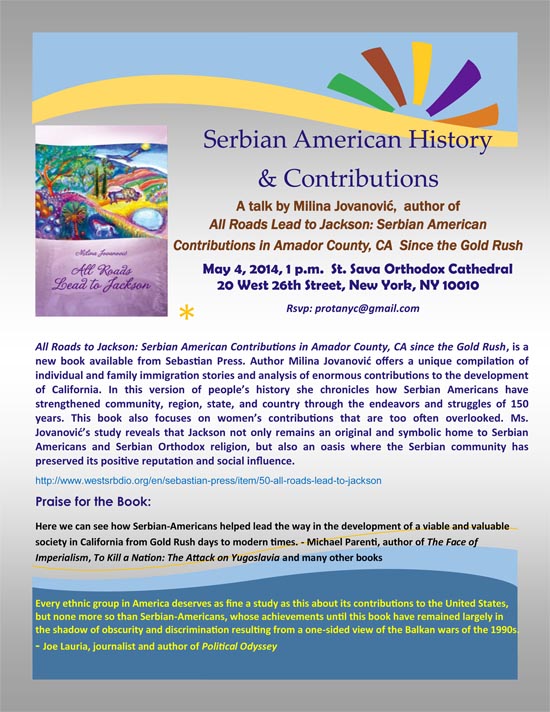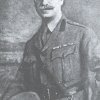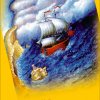
A great man is one who collects knowledge the way a bee collects honey and uses it to help people overcome the difficulties they endure - hunger, ignorance and disease!
- Nikola Tesla
Remember, remember always, that all of us, and you and I especially, are descended from immigrants and revolutionists.
- Franklin Roosevelt
While their territory has been devastated and their homes despoiled, the spirit of the Serbian people has not been broken.
- Woodrow Wilson
People Directory
Џон Фротингам и Јелена Лозанић
Џон Фротингам
Џон Фротингам (John Frothingham, Бруклин, 1879 — 1935) био је амерички правник, индустријалац, савременик и учесник Великог рата и велики љубитељ музике преко које дознао за судбини словенских народа у рату, коме је помогао прикупљањем деце – ратне сирочади и оснивањам четири Американска васпитна дома за ратну сирочад и напуштену децу. Носилац је Карађорђеве звезде са мачевима и Краљевског ордена Белог орла.Рођен је у Бруклину, у богатој и угледној породици из које потиче и један од највећих америчких сликара Џејмс Фротингам. Завршио је француски језик, свирао клавир и бавио се компоновањем. После дипломирања, музика га је одвоела у Беч, Минхен и Праг са циљем да усаврши технику свирања.
Са Србима, чији ће велики добротвор постати у Великом рату, дошао је у контакт преко исељеничких друштава која су свирала балканску етно музику у САД. Као заљубљеника балканске музике, несрећа Србије у Великом рату, у лето 1914. године погодила га је толико да је у више наврата донирао медицински материјал и новац за ратом захваћену земљу.
Read more ...Publishing
History, Truth, Holiness
by Bishop Maxim Vasiljevic
Bishop Maxim’s first book, described by Fr. John Breck as an “exceptionally important collection of essays” contributing to both the theology of being and also contemporary theological questions, is now available! Christos Yannaras describes Bishop Maxim as “a theologian who illumines” and Fr. John McGuckin identifies his work as “deeply biblical and patristic, academically learned yet spiritually rich.” The first half of the book collects papers emphasizing theological ontology and epistemology, reminding us how both the mystery of the Holy Trinity and that of the Incarnation demand that we rethink every philosophical supposition; it includes chapters on holiness as otherness, truth and history, and the biochemistry of freedom. The second half of the book features lectures dedicated to the theological questions posed by modern theology, including studies of Orthodox and Roman Catholic ecclesiology, liturgics, and the theology of icons.
Latest US News
- Волт Богданић: Американац српског порекла добитник три Пулицерове награде за истраживачко новинарство
- The American Srbobran - Building a Partnership with the Library of Congress and Institutions in Serbia
- „Американски Србобран“ унапређује сарадњу са Конгресном библиотеком у Вашингтону и институцијама у Србији
- Преминуо чувени амерички песник српског порекла Чарлс Симић
- Јован Дучић међу великанима у кливлендској башти
- Србија, Африка, Америка и Канада славе дан Теслиног рођења
- Документарац Немање Станковића приказан у Холивуду
- Tesla Rhapsody
- Saved by Beauty: Dostoevsky in New York
- Izložba likovnih radova o Dostojevskom
- Steve Popovich - the man who discovered Meat Loaf
- Odlazak čoveka koji je mnogo uradio za očuvanje sećanja na lik i delo Nikole Tesle
- Naš otac Balkanac za Ruse je smislio bijelu Coca-Colu
- Neverovatan poduhvat srpske pravoslavne zajednice u Americi
- Prva Srpkinja u finalu najveće evropske nagrade za pronalazače
Latest Serbia News
- На Станфорд листи 15 крагујевачких научника
- Naše postojanje skriva mračne i svetle strane, i veliko je umeće prepoznati ih i razlučiti
- Српска застава је најлепша на свету – на основу резултата анкете милион људи
- Недеља америчке културе
- Preminuo pisac Aleksandar Petrov
- Spomenik Branku Pešiću radiće srpski vajar iz Los Anđelesa
- Metropolitan Amfilohije buried in the Cathedral church in Podgorica
- Memorial prayer rite for Metropolitan Amfilohije in the Cetinje Monastery
- На данашњи дан рођен је Михајло Идворски Пупин
- Алекса је стигао до Принстона, али Математичкој гимназији се радо враћа
- Каубој православац и 40 Американаца посетили Косово
- Архив Војводине: Сведочанства времена у спомен на херојске претке
- Премијера „Теслиног народа“ на Коларцу
- Када се велики умови играју науком о подацима
- Američka vojska donirala je vrednu opremu klinici u Nišu




